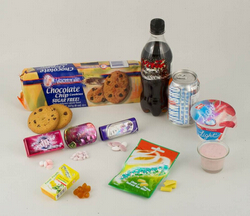
Food Safety Focus (106th Issue, May 2015) – Food Safety Platform
Role of Sweeteners in Reduction of Sugar Intake (Part I)
Reported by Ms. Joey KWOK, Scientific Officer,
Risk Assessment Section,
Centre for Food Safety
Our desire for sweet taste extends across different ages, races and cultures. This article discusses the role of sweeteners, in particular low-calorie sweeteners, in replacing some of the added sugar in our diet, and its implications for weight control.
World Health Organization's Guideline on Sugar Intake
In March 2015, the World Health Organization (WHO) released the Guideline: Sugars Intake for Adult and Children, in which a reduced intake of free sugars throughout the lifecourse as well as reducing intake of free sugars to less than 10% of total energy intake in both adults and children was strongly recommended. Free sugars include monosaccharides and disaccharides added to foods and beverages by the manufacturer, cook or consumer, and sugars naturally present in honey, syrups, fruit juices and fruit juice concentrates. WHO also suggests that a further reduction of free sugars intake to below 5% of total energy intake would provide additional health benefits in the form of reduced dental caries.
Translating the above-mentioned WHO's recommendations into daily practice, for a total energy intake of 2000 kcal a day, the daily "allowance" for free sugars would be 50g (strong recommendation) and 25g (conditional recommendation), respectively. With these recommendations in mind, some may wonder whether we are still going to be able to enjoy sweet-tasting food and beverages without exceeding the recommended sugar intake limits.

Various forms of food and beverages containing sweetener
The Nature of Low-calorie Sweeteners
Low-calorie sweeteners (e.g. aspartame, sucralose and neotame) have very little or no caloric values. They are also known as intense sweeteners because they are substantially sweeter, ranging from several dozen to several thousand times sweeter than table sugar (i.e. sucrose), and thus only a tiny amount is needed to give the food enough sweetness, resulting in substantial calorie-savings.
Indeed, low-calorie sweeteners offer a feasible alternative to enjoy sweet-tasting food and beverages without the added sugar or calories. The safety of low-calorie sweeteners that are suitable for food use has been evaluated by international food safety authorities, and thus these sweeteners can be safely incorporated as part of a varied and balanced diet. Food safety authorities worldwide share the same view. Further information on the food safety of sweeteners can be found from previous issues of Food Safety Focus.
Low-calorie Sweeteners and Weight Control
According to WHO, the totality of evidence reviewed indicates that increasing or decreasing free sugars is associated with parallel changes in body weight, and the relationship is present regardless of the level of intake of free sugars. The excess body weight associated with free sugars intake results from excess energy intake. This brings to the next question: is it possible to achieve weight control simply by replacing free sugars with low-calorie sweeteners?
Some of us may be aware that some earlier studies had brought about the hypotheses that low-calorie sweeteners might stimulate appetite or increase food intake, and in turn cause people to gain weight. Nowadays, more recent research findings have become available. Evidence from short-term randomised control trials consistently indicates that when low-calorie sweeteners are used to replace sugar, the resulting reduction in calories can help to achieve short-term weight loss. Recent studies have not observed that low-calorie sweeteners promote overeating. Nevertheless, there is insufficient evidence at present to conclude the relationship between the use of low-calorie sweeteners and long-term weight control.
Indeed, the key to maintaining body weight is not to consume more calories than are burnt. Low-calorie sweeteners can be used as an alternative to save calories by replacing table sugar. Nevertheless, they only work if the calorie saving is not added back, say by eating more food as a reward later in the day, or by taking in more of other calorie-yielding nutrients such as other types of carbohydrates, protein and fat in the overall diet. Achieving long-term weight maintenance rests on a healthy and active lifestyle that includes a sensible, balanced diet and regular physical activity, and this requires long-term commitment.
In the next article, we will look into how the human beings respond to sweet taste, and the concerns on the use of sweeteners among children.


